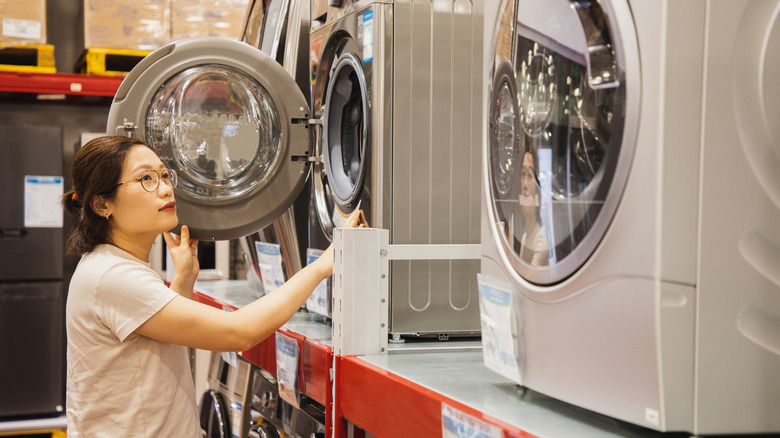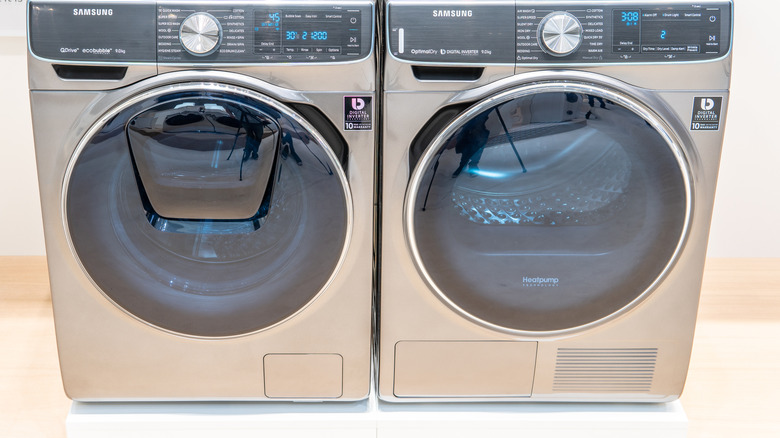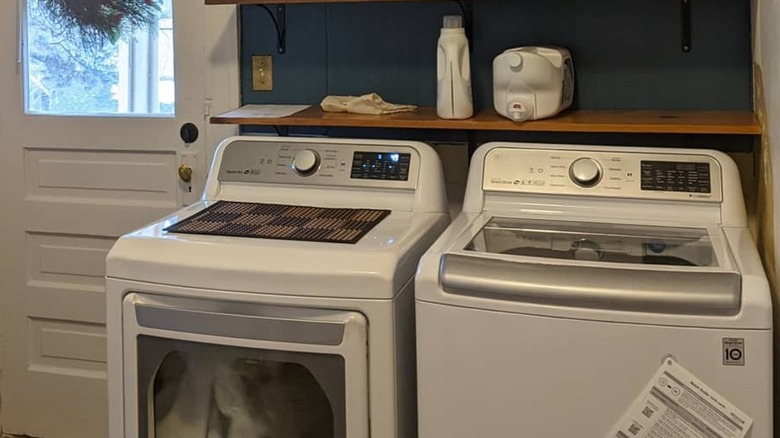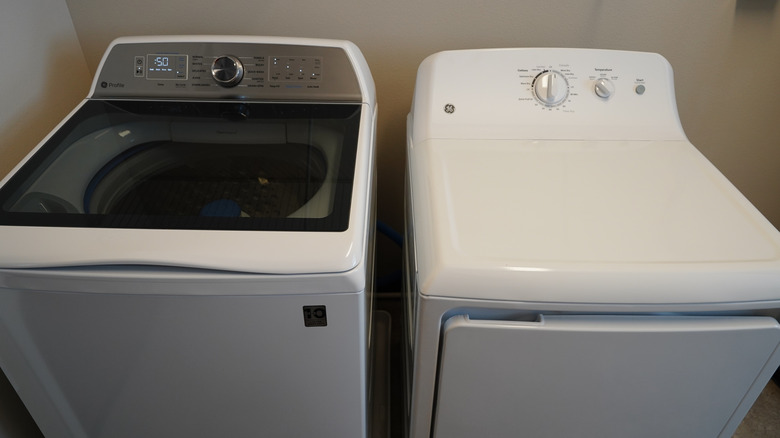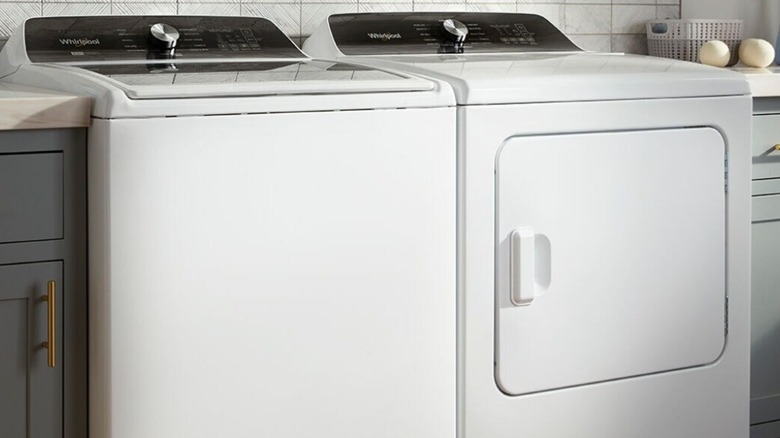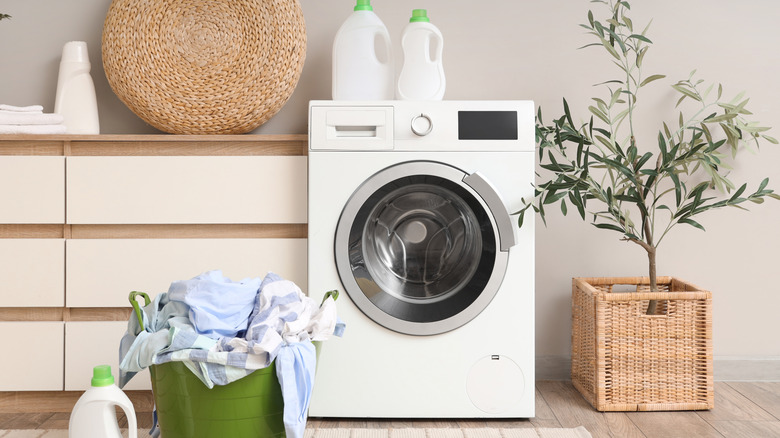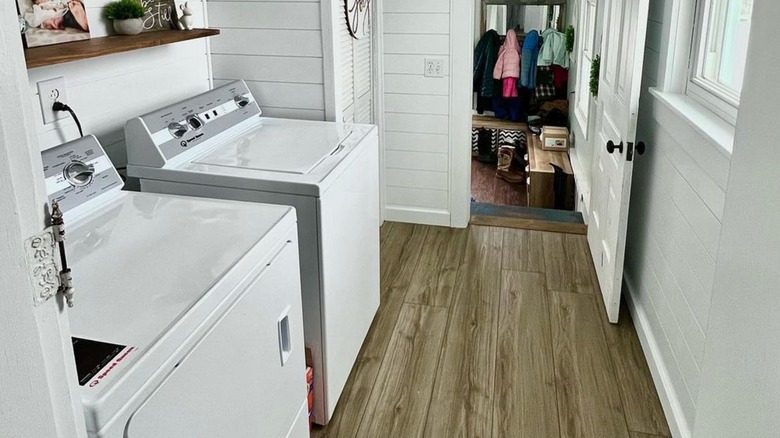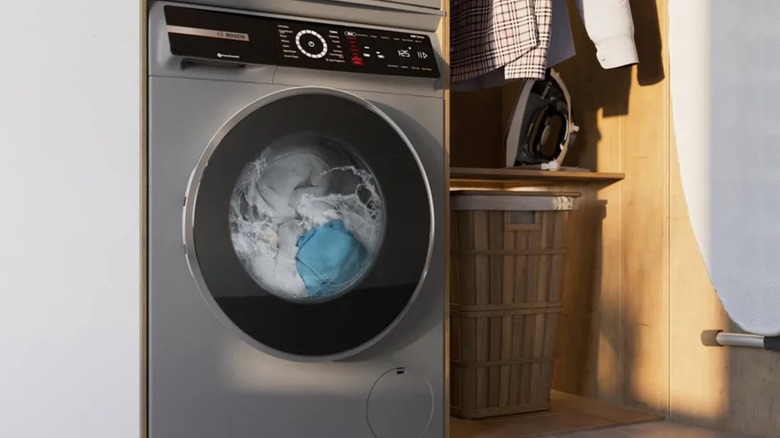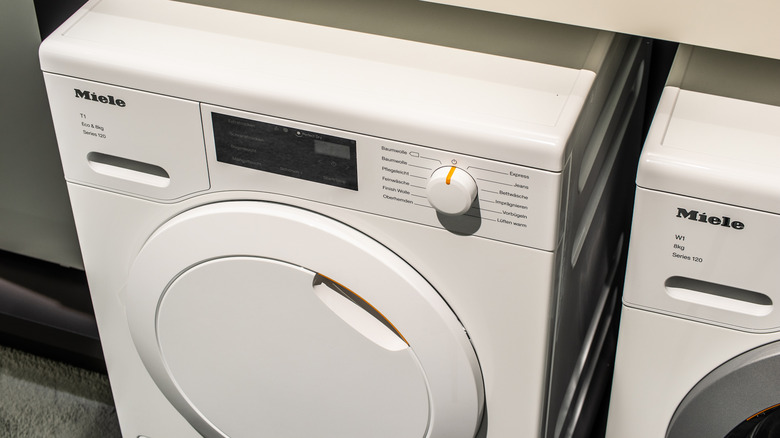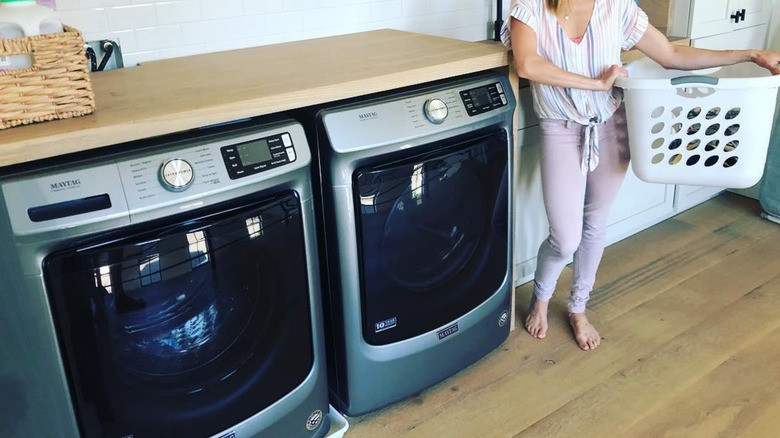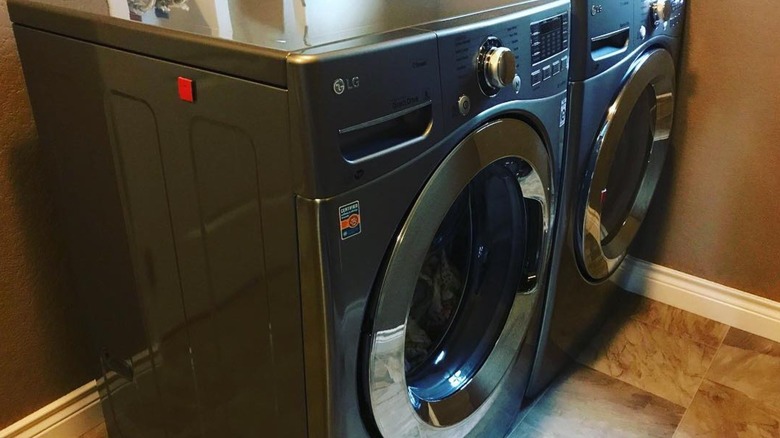5 Washing Machine Brands Experts Say To Skip (And The Best Alternatives To Consider)
Generally, a washing machine that's cared for should last about seven to 13 years in a household. However, falling for marketing gimmicks and sinking your money in unreliable appliance brands will shorten this time frame dramatically. Unclean clothes, cycles stopping mid-way through, and appliances making weird noises are just a few other ways they'll make you hate laundry even more. And if you decide to walk the hard path, these money traps will empty your coffers with constant part replacements. Even minor repairs cost $50 to $300 for a top-loader and $100 to $400 for a front-loading washer.
Considering these eye-watering risks, House Digest sat down with two experts exclusively to find the top five washing machine brands you should skip, as well as their robust alternatives. Basically, you should approach washers from Samsung, Whirlpool, GE (low-cost ones), LG (top-loaders are the worst offenders), and off-brands with caution. Instead, try out Speed Queen, Miele, Maytag, Bosch, and LG (front-loaders). As for the companies that aren't on our list, Dennis Godynuk, licensed washing machine expert at Comfort Appliance Repair, suggests you purchase them after due diligence. "Buy from a dealer that services what they sell, check parts availability by model number, and pay for the longest real warranty you can. Pick simpler controls over flashy screens. Good install and leveling in day one prevents half the service calls I get." With that established, here's why certain brands aren't worth the price tag — and here are the best alternatives.
Skip: Samsung washers are prone to balance, spin, and control board issues
From manufacturing the two-tub Galaxy WM in 1974 to delivering smart AI models in 2025, Samsung washing machines have come a long way. In fact, its Bespoke AI Laundry Combo snagged the Best in Design award at the IFA 2025. However, don't invest in it if you want to get some use out of your washer, rather than admiring it in your laundry room. Sharing the reason, Godynuk mentions, "In my experience dealing with washers, Samsung washers are the most likely to show up with no-spin, balance, or control board issues." Whether you opt for the basic $700 model or spring for the ultra-swanky $3,300 AI one, there's no guarantee you'll get your money's worth. In fact, customers buying machines from the Bespoke line complain that they stop mid-cycle and vibrate uncontrollably post installation. Your only recourse during the warranty period? Reaching out to the brand and waiting for an authorized technician to come to your home for repairs.
Since most models come with just one year warranty on parts and labor, you'll have to shoulder the cost for spare parts if problems crop up after the 12-month mark. "Parts can be slow to arrive and pricey, which turns a simple fix into weeks without a washer. A family in East Nashville waited three weeks for a main PCB last summer and gave up," he adds. That being said, you can potentially speed up the repair process if you opt for Samsung Care and detail the issues with your machine. The brand's parts predictor technology might determine the accessories needed for repair, helping the tech repair your washer during their initial visit.
Skip: LG top-loaders can develop finicky issues
Started as Goldstar Co., Ltd in October, 1958, LG Electronics has been producing washing machines since May, 1969. With over 56 years under its belt, this Korean company is one of the most reliable appliance brands according to a survey conducted by Consumer Reports. Alas, their washers can be a mixed bag, notes Godynuk. "LG is mixed. Many of their front-loaders do well for years if you keep the door ajar and clean the drain filter. Their top-load models give me more headaches: finicky water-level sensors and control boards, plus balance errors." Since you'll be spending anywhere between $900 and $1,500 for a top-loader, it's best if you skip them. For loyal customers of the company, he advises, "If a customer wants LG, I point them to a front-loader and suggest an extended warranty."
In case you've already bought a top-loader, know that the parts and labor are covered for one year while the drum enjoys a three-year warranty, provided you register your washer. The direct drive motor remains protected for 10 years. After the warranty period lapses, take advantage of LG's Help Library to troubleshoot minor issues yourself and save repair costs. You can even chat with ThinQ (the brand's virtual assistant) if you face issues. Otherwise, schedule a repair from LG at a flat rate of $349 (excluding taxes). However, there's a catch: Your washer needs to have been made in the past seven to 10 years (only for certain models) to be eligible for this program.
Skip: Budget GE washers don't have a high level of reliability
Established in 1892, GE has a rich history of developing breakthrough home appliances. The domestic brand produced its first completely automatic clothes washer in 1947 and has been refining its washing machine line since. But don't let the benefits of buying American-made appliances cloud your judgement. This holds especially true for budget-friendly models (often top-loading), priced at $700 to $750. Even if you spot them on sale and are tempted by the low prices, don't give in, or you'll have to bear repair costs once the warranty lapses. Godynuk agrees and mentions, "Service network and parts access are decent, but I see early failures on some budget models: lid locks, shifter actuators, and occasional board issues. Not a blanket 'avoid,' just be careful with the lowest-price versions and check real parts availability."
Although GE has a dedicated Appliances Parts Search page, you'll have to enter your device's full model number to view the accessories available for a machine. This is usually listed on a washer's interior. So, unless you can quickly jot down the code while browsing devices at your local retailer, try looking for available parts at your nearby appliance repair stores. You might find them at Lowe's or Home Depot, too. In case there's good availability of the parts or you're on a tight budget, know that GE washers come with a one year warranty from the purchase date on parts and labor. Post that, explore the brand's FAQ page on washers to take care of minor issues before calling a pro.
Skip: Whirlpool washers with touch screens means one more thing that can go wrong
Whirlpool forayed into the world of appliance manufacturing with an electric wringer-washer in 1911. So, in a way, these appliances are the devices that launched the American brand. Considering this, it can be surprising to see the nearly 115 year-old company listed in the skip section. Explaining his love-hate relationship with the company's washers, Godynuk says, "I like them for one big reason: parts are easy to get and reasonably priced. The simple top-loaders with a real agitator and manual knobs are reliable and easy to fix. I tell folks to skip the touchscreens they don't need. Less to go wrong." This means you can bring home the basic top-loading machines, starting from as little as $550. However, steer clear of the expensive ones going for over $1,400, unless you're willing to pay extra for repairs or replacements when (not if) the panel starts acting up.
Whirlpool's washers are covered (parts and labor only) for a year from the day the machine is delivered to your home. Avoid putting the appliance in a room with high-humidity, since rusted parts due to customer negligence aren't covered under warranty. After the year is up, troubleshoot cleaning, performance, error codes, or minor water-related concerns yourself. In case you're a pro DIY-er, you can even purchase authentic parts from the brand and repair your washer at home. Otherwise, schedule a repair appointment and be prepared to pay between $215 and $385 (approximately).
Skip: Off-brands with limited U.S. parts aren't worth the savings if anything goes wrong
Buying an off-brand washing machine that barely costs $300 may seem like a good deal initially. After all, what's in a name, right? Alas, cheap appliances will cost you dearly in repairs, because these pieces rarely use good quality materials. Emphasizing why you should never accept a deal that seems too good to be true, Godynuk shares, "I pass on ultra-cheap labels with thin U.S. support. The first repair turns into a parts scavenger hunt and costs more than the machine is worth." And even if your device is within warranty and a company offers excellent customer support, you may have to wait a while for the parts to arrive at your location.
So, steer clear of all off-brand washers you see in your local hardware store or online. You should also avoid purchasing one from companies that aren't fully-established in the U.S. and have difficulties offering dependable after-sale support. For example, Midea is a China-based firm that was established in 1968. Even though it has a R&D center in Kentucky, its washers aren't American-made. As such, you can mostly purchase them through third-party retailers, like Amazon. The devices have a two-year limited warranty, but securing parts might be an issue, since Midea doesn't sell them directly. They're sold through another website it doesn't control, so it can't verify the quality of the items. Even if you're prepared to take the risk, there's no guarantee the required accessory will be available. Worse, they aren't cheaper (granted they do come loaded with more features) than name-brands like Whirlpool, so stick with trusted companies to avoid regrets later.
Better alternative: Speed Queen washers are highly robust
Looking for a laundry appliance brand that's worth the hype? Speed Queen is your best bet. Established over 115 years ago, it engineers heavy-duty washers, so they last you about 25 years in a residential setting. "If you want a 'buy it once' top-loader, this is it. Metal guts, serviceable design, strong warranties," opines Godynuk. David Miloshev, licensed electrician, appliance technician, and HVAC expert at Fantastic Services, has a similar opinion and states, "This is a brand with a legendary reputation for longevity. Speed Queen washers, especially those with agitator-style top-loaders, are renowned for their rugged, commercial-grade builds and can often last decades. There are also consumers who vouch for their durability." The only con? You have to pay a premium to bring one of these washers home. Front loaders start from $2,450 and can cost over $2,500, whereas top-loading machines range between $1,450 and $1,750.
The good news is you won't have to worry too much about footing repair bills. This is because Speed Queen puts all its washers through 10,400 testing cycles — the exact number of runs you'd put a machine through in 25 years; that, too, if you're diligent about doing your laundry multiple times in a week. The cherry on top? The machines have a minimum warranty period of three years, with a few models enjoying five or seven-year coverage. Even after the warranty period is up, the appliance won't require expensive replacements. "I mostly see them for tune-ups, not big failures," assures Godynuk.
Better alternative: Bosch washers are built to last
Established in 1886 in Germany, Bosch manufactured its first automatic washing machine in 1961. In the past 65 years (almost), their washers have continued to evolve, with the latest ones being energy- and water-efficient, rich in features (Iron Assist minimizes wrinkles), and smartphone-friendly. Miloshev is a fan, too, and remarks, "This is a consistently reliable brand known for its robust German engineering. Bosch washers offer quiet, stable operation thanks to features like EcoSilence Drive, AntiVibration design, and water-saving innovations like ActiveWater and VarioPerfect." Wondering which model you should go for? Godynuk recommends the 300 or 500 compact front-load washers because they're "gentle on clothes, efficient, and parts are available. Great choice for smaller spaces or stacked laundry." Although these models will help you find extra space in your cramped laundry closet, they'll leave a big dent in your savings. The 300 series is the cheapest of the lot and features two variants, one costing $1,250 and the other $1,350. You'll have to shell out $1,550 for the 500 series, while the sleek 800 series is priced at $2,000.
On the bright side, they enjoy a 365-day limited product warranty from the day they're delivered to your house. They also boast of a 30-day cosmetic warranty, so you won't have to worry about scratched or dented appliances. Plus, they won't cause you a lot of headaches; you can take care of common errors yourself. "Consumers appreciate the easy availability of spare parts and the machine's long service life," promises Miloshev. Bosch has set up two factories in America — one in North Carolina and one in Tennessee — and produces its washers locally. This means you can easily buy spare parts through their U.S. website.
Better alternative: Miele washers can handle a lot of mileage
Incorporated in 1899, Miele started tinkering with washers in 1903 and developed numerous iterations to keep up with changing times, evolution of technology, and consumer demand. Finally, in 2001, it outfitted its machines with the patented honeycomb drums. Driven by its motto to deliver better products that are sustainable (it's the proud recipient of the 2024 German Sustainability Award), the company puts its residential appliances through rigorous testing. Detailing the reasons he recommends Miele's washers, Miloshev notes, "This is a premium German brand noted for meticulous engineering and long lifespans. Miele washing machines are often tested to run for 20 years with excellent reliability. They stand out for build quality and performance, offering long-term value despite a higher price tag." They cost a minimum of $1,600 and can go up to $2,500.
Even though the initial pocket pinch is high, you stand to get a high ROI (return on investment) from your appliance. Godynuk elaborates, "High upfront cost, but built well. When installed and leveled right, they run for years. A short-term rental owner I work with runs Miele daily without drama." Moreover, features like Automatic Load Recognition ensures that your machine uses just the right amount of electricity and water. Plus, if you're big on sustainability and want to use saved rainwater for washing your clothes, they come with a second water connection. The manufacturer even claims that running a hot water cycle will save you nearly 65% on electricity costs. Additionally, its washers enjoy a limited warranty of two years in the U.S.
Better alternative: Maytag washers are both trendy and dependable
Maytag sold its first washing machine, a wood-tub, hand crank model, in 1907. 120 years (nearly) has wrought multiple changes internally (it was acquired by Whirlpool in 2006), but its promise to deliver dependable products that last hasn't changed. Miloshev echoes similar sentiments and says, "This is a long-established brand prized for its sturdy build and dependable performance. Maytag boasts a commercial-grade quality label and many models are known to last over 10 years. Despite following trends, Maytag still emphasises longevity, making it a practical choice for heavy daily use." So, if you spend between $800 and $1,100 for a front-loader or are willing to part with $580 to $1,100 for a top-loader, you're sure to get a decent return on your invested capital.
The washers come equipped with several features, like an Extra Power button that gets rid of stains on all wash cycles and the Sanitize cycle that uses hot water to eliminate 99.9% of household bacteria, such as P. aeruginosa, K. pneumoniae, and S. aureus. A few even come with smart and late add features. Regarding coverage, Maytag offers a one-year limited warranty for parts and labor. For the laundry appliances manufactured post 2017, a washer's drive motors (just rotor and stator are covered) and wash basket (just the side walls) are covered for 10 years. This means the brand will pay for replacement parts should anything go wrong with these parts.
Better alternative: LG front-loaders are a reliable, feature-rich washer option
According to ACSI's Home Appliance and Electronics Study 2025, customers are the most satisfied with LG in the washing machine category. They also gained the second performed well in CR's 2004 Appliance Brand Reliability Rankings survey. But what makes the company deserve the title of the most reliable washing machine brand in 2025? Godynuk opens up, "If someone wants a full-size front-loader with modern features, LG's front-loaders have been solid for many of my clients. Leave the door cracked, clean the filter, and they behave." This laundry tip will also keep your clothes smelling fresh. Moreover, the company offers a wide range of products to fit every type of requirement. A basic model is priced at $1,050, while a high-end one can cost you up to $2,100, though you might find good discounts on these products.
Sharing his reasons for giving the brand a thumbs-up, Miloshev mentions, "LG is praised for its innovative yet durable design. Its direct-drive motors have fewer moving parts and often come with 10-year warranties." The drum, as well as the parts and labor, enjoy warranties similar to their front-loading brethren — three and one year, respectively. Though you can extend it if you'd like your device to be covered for longer.
